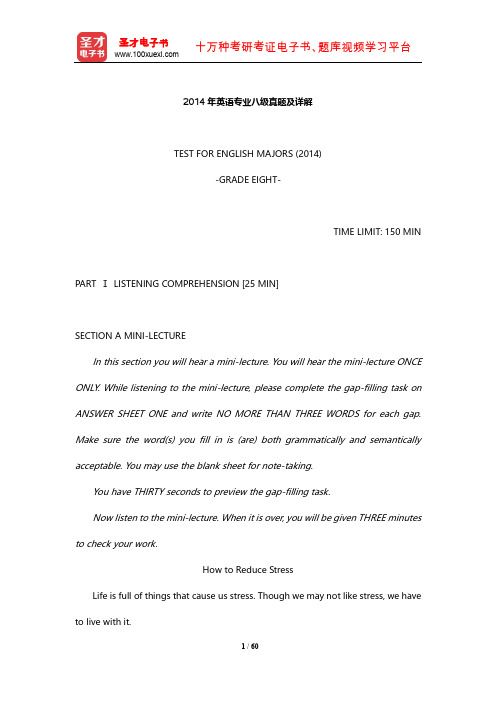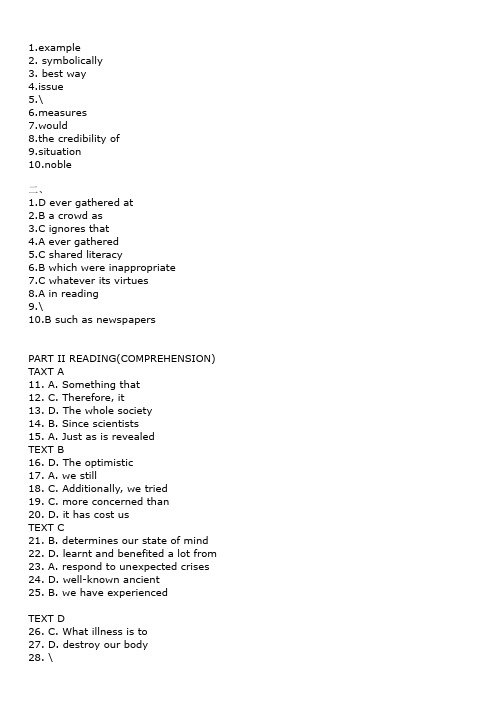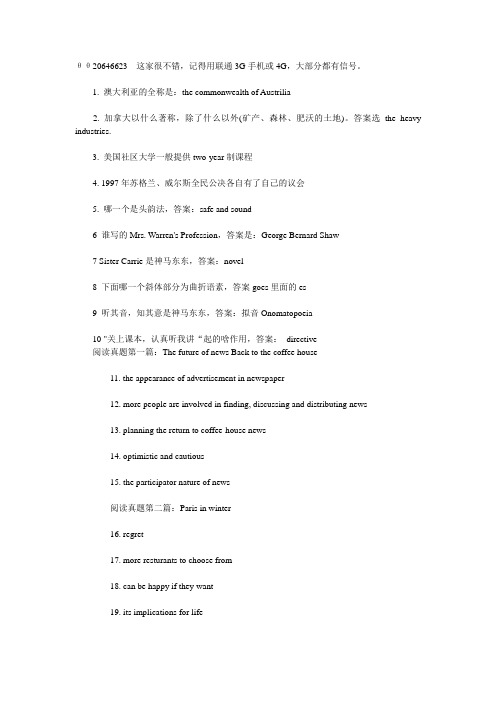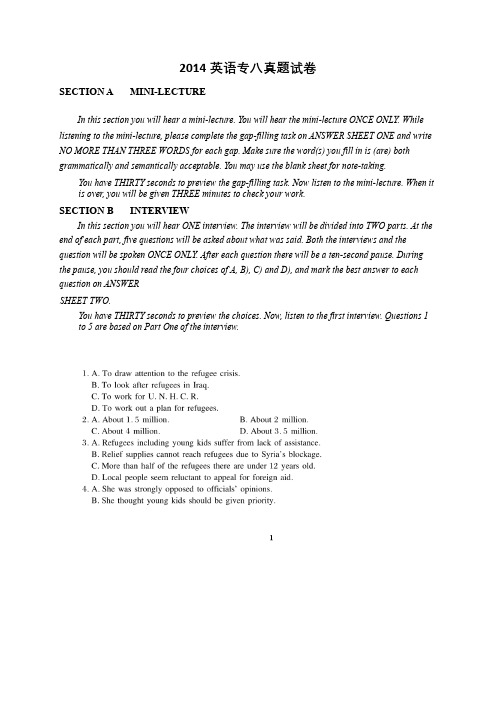2014年英语专八考试阅读练习题(11)
2014年英语专业八级真题及详解【圣才出品】

2014年英语专业八级真题及详解TEST FOR ENGLISH MAJORS (2014)-GRADE EIGHT-TIME LIMIT: 150 MIN PART ⅠLISTENING COMPREHENSION [25 MIN]SECTION A MINI-LECTUREIn this section you will hear a mini-lecture. You will hear the mini-lecture ONCE ONLY. While listening to the mini-lecture, please complete the gap-filling task on ANSWER SHEET ONE and write NO MORE THAN THREE WORDS for each gap. Make sure the word(s) you fill in is (are) both grammatically and semantically acceptable. You may use the blank sheet for note-taking.You have THIRTY seconds to preview the gap-filling task.Now listen to the mini-lecture. When it is over, you will be given THREE minutes to check your work.How to Reduce StressLife is full of things that cause us stress. Though we may not like stress, we have to live with it.1. ____【答案】physical【解析】细节题。
这篇讲座主要围绕压力展开。
2014专八答案

1.example2. symbolically3. best way4.issue5.\6.measures7.would8.the credibility of9.situation10.noble二、1.D ever gathered at2.B a crowd as3.C ignores that4.A ever gathered5.C shared literacy6.B which were inappropriate7.C whatever its virtues8.A in reading9.\10.B such as newspapersPART II READING(COMPREHENSION) TAXT A11. A. Something that12. C. Therefore, it13. D. The whole society14. B. Since scientists15. A. Just as is revealedTEXT B16. D. The optimistic17. A. we still18. C. Additionally, we tried19. C. more concerned than20. D. it has cost usTEXT C21. B. determines our state of mind22. D. learnt and benefited a lot from23. A. respond to unexpected crises24. D. well-known ancient25. B. we have experiencedTEXT D26. C. What illness is to27. D. destroy our body28. \29. D. Mostly minor and surmountable30. B. be rendered beneficialPART III GENERAL KNOWLEDGE31.A.Making us hardy enough32.C.Sichuan recently for33.D.By which we forecast earthquakes34.B.200135.D.We should build36.A.John Galsworthy37 C.two-year38 B.improve39 C.more determined to40 C. Should betterPART IVPROOFREADING & ERROR CORRECTION1. height→high2. interpret→interpreting3. are 前加of4. drew→paid5. Europe→European6. who→which7. ways→way8. 删have9. each→every10.diagnosed前加werePreacher lamented:"the books there is no end," did not find that he has spoke highly ofthe writersof this profession. Indeed,writing, travel, the accumulation of wealth is no end. A problem causedby another problem. We areconstantly learning, and never reach the hearts desire is so knowledgeable. We could not always carved their favoritestatue. When they find a new continent,orcrossed a mountain range, we always see from afar there was never setfoot in the ocean and land.Vastuniverse, there is always something for us to work hard, there is always room for us toexplore. It works like Carlisle can read. Even in a corner, ina private garden or a farm nearthecycle of seasons, the weather changing, even lived there for a lifetime, there will always bethings thatsurprise at us.随着能源成本的上升,越来越多的美国人正在转向生物能源提供动力的家园和工作场所。
2014专八英语阅读理解

2014专八英语阅读理解Ah, the English proficiency exam in 2014, it was quite a challenge! I remember the reading comprehension section; it really tested our comprehension skills. One passage talked about the impact of technology on society, how it's changed the way we communicate and do things. It waswritten in a really informative tone, with facts andfigures to back up the points.Another passage was more descriptive, talking about a journey through a remote part of the world. The language was vivid, painting a picture in my mind as I read. I could almost smell the air and hear the sounds described.There was also a passage on the history of a famous invention. It had a more narrative style, telling the story of how it came to be and the impact it had. It was fascinating to read about the struggles and triumphs of the inventors.One passage stood out to me because of its use of humor. It was about the challenges of learning a new language and the funny mishaps that can happen. It made me laugh outloud while also nodding in agreement at the struggles described.Lastly, there was a passage on current environmental issues. It was written in a very passionate tone, urging readers to take action. The language was strong and emotive, making me feel the urgency of the situation.Overall, the reading comprehension section in the 2014 English proficiency exam was diverse and challenging. It really tested our ability to understand different types of writing and grasp the key ideas from each passage. It was a great experience!。
2014年英语专业八级真题及详解【圣才出品】

2014年英语专业八级真题及详解TEST FOR ENGLISH MAJORS(2014)-GRADE EIGHT-TIME LIMIT:150MIN PART I LISTENING COMPREHENSION(25MIN)SECTION A MINI-LECTUREIn this section you will hear a mini-lecture.You will hear the mini-lecture ONCE ONLY.While listening to the mini-lecture,please complete the gap-filling task on ANSWER SHEET ONE and write NO MORE THAN THREE WORDS for each gap. Make sure the word(s)you fill in is(are)both grammatically and semantically acceptable.You may use the blank sheet for note-taking.You have THIRTY seconds to preview the gap-filling task.Now listen to the mini-lecture.When it is over,you will be given THREE minutes to check your work.How to Reduce StressLife is full of things that cause us stress.Though we may not like stress,we have to live with it.【答案与解析】(1)physical细节题。
这篇讲座主要围绕压力展开。
在提出问题“What is stress”之后,演讲者说到“The term was originally used in physics to describe the force exerted between two touching bodies.That was strictly a term describing a physical reaction”,即stress最初用在物理学中,指两个相互碰撞的物体之间产生的力量,严格地说是一个用来描述物理反应的术语。
2014年专八模拟题(阅读理解)

Computers monitor everything in Singapore from soil composition to location of manholes. At the airport, it took just 15 seconds for the computerized immigration system to scan and approve my passport. It takes only one minute to be checked into a public hospital. By 1998, almost every household will be wired for interactive cable TV and the Internet, the global computer network. Shoppers will be able to view and pay for products electronically. A 24-hour community telecomputing network will allow users to communicate with elected representatives and retrieve information about government services. It is all part of the government’s plan to transform the nation into what it calls the “Intelligent Island”. In so many ways, Singapore has elevated the concept of efficiency to a kind of national ideology. For the past ten years, Singapore’s work force was rated the best in the world-ahead of Japan and the U.S.-in terms of productivity, skill and attitude by the Business Environment Risk Intelligence service. Behind the “Singapore miracle” is a man Richard Nixon described as one of “the ablest leaders I have met,” one who, “in other times and other places, might have attained the world stature of a Churchill.” Lee Kuan Yew led Singapore’s struggle for independence in the 1950s, serving as Prime Minister from 1959 until 1990. Today (1995), at 71, he has nominally retired to the office of Senior Minister, where he continues to influence his country’s future. Lee offered companies tax breaks, political stability, cheap labor and strike-free environment. Nearly 90 percent of Singaporean adults now own their own homes and thanks to strict adherence to the principle of merit, personal opportunities abound. “If you’ve got talent and work hard, you can be anything here,” says a Malaysian-born woman who holds a high-level civil-service position. Lee likes to boast that Singapore has avoided the “moral breakdown” of Western countries. He attributes his nation’s success to strong family ties, a reliance on education as the engine of advancement and social philosophy that he claims is superior to America’s. In an interview with Reader’s Digest, he said that the United States has “lost its bearings” by emphasizing individual rights at the expense of society. “An ethical society,” he said, “is one which matches human rights with responsibilities.” 1.What characterizes Singapore’s advancement is its___. puter monitoring. B.work efficiency. C.high productivity. D.value on ethics. 2.From Nixon’s perspective, Lee is___. A.almost as great as Churchill. B.not as great as Churchill. C.only second to Churchill in being a leader. D.just as great as Churchill. 3.In the last paragraph, “lost its bearings” may mean___. A.become impatient. B.failed to find the right position. C.lost its foundation. D.grown band-mannered. 4.“You can be anything here”(Paragraph 5) may be paraphrased as___. A.You can hope for a very bright prospect. B.You may be able to do anything needed. C.You can choose any job as you like. D.You will become an outstanding worker. 5.In Singapore, the concept of efficiency___. A.has been emphasized throughout the country. B.has become an essential quality for citizens to aim at. C.is brought forward by the government in order to compete with America. D.is known as the basis for building the “Intelligent Island.”。
2014年专八答案

θθ20646623 这家很不错,记得用联通3G手机或4G,大部分都有信号。
1. 澳大利亚的全称是:the commonwealth of Austrilia2. 加拿大以什么著称,除了什么以外(矿产、森林、肥沃的土地)。
答案选the heavy industries.3. 美国社区大学一般提供two-year制课程4. 1997年苏格兰、威尔斯全民公决各自有了自己的议会5. 哪一个是头韵法,答案:safe and sound6 谁写的Mrs. Warren's Profession,答案是:George Bernard Shaw7 Sister Carrie是神马东东,答案:novel8 下面哪一个斜体部分为曲折语素,答案goes里面的es9 听其音,知其意是神马东东,答案:拟音Onomatopoeia10 "关上课本,认真听我讲“起的啥作用,答案:directive阅读真题第一篇:The future of news Back to the coffee house11. the appearance of advertisement in newspaper12. more people are involved in finding, discussing and distributing news13. planning the return to coffee-house news14. optimistic and cautious15. the participator nature of news阅读真题第二篇:Paris in winter16. regret17. more resturants to choose from18. can be happy if they want19. its implications for life20. thoughtfulness阅读理解第三篇21. Geographic location22. the government’s determination23. denmark’s energy-saving success offers the world a useful model24. the country’s previous experience of oil shortage25. energy saving cannot go together with economic growth。
2014年考研英语试题及答案阅读理解八

2014年考研英语试题及答案阅读理解八Passage 15There is a popular belief among parents that schools are no longer interested in spelling. No school I have taught in has ever ignored spelling or considered it unimportant as a basic skill. There are, however, vastly different ideas about how to teach it, or how much priority (优先)it must be given over general language development and writing ability. The problem is, how to encourage a child to express himself freely and confidently in writing without holding him back with the complexities of spelling?If spelling become the only focal point of his teacher's interest, clearly a bright child will be likely toplay safe. He will tend to write only words within his spelling range, choosing to avoid adventurous language. That's why teachers often encourage the early use of dictionaries and pay attention to content rather than technical ability.I was once shocked to read on the bottom of a sensitive piece of writing about a personal experience:This work is terrible! There are far too many spelling errors and technical abilities in writing, but it was also a sad reflection on the teacher who had feelings. The teacher was not wrong to draw attention to the errors, but if his priorities had centered on the child's ideas, an expression of his disappointment with the presentation would have given the pupil more motivation(动力)to seek improvement.71. Teachers are different in their opinions about .A) the necessity of teaching spellingB) the role of spelling in general language developmentC) the way of teaching spellingD) the complexities of the basic writing skills72. As used in the second paragraph, the expressionplay safemost probably means .A)to spell correctlyB)to write smoothlyC)to avoid using words one is not sure ofD)to use dictionaries frequently73. Teachers encourage the students to use dictionaries so that .A)students will be able to write more freelyB)students will be more skillful in writingC)students will be more confident in writingD)students will be independent enough74. The author's tone is .A) ironicC) satiricalB) practicalD) critical75. This passage mainly discusses .A)the necessity of spellingB)the role of developing writing skillsC)the complexities of spellingD)the relationship between spelling and the content of writingPassage 16Tea drinking was common in China for nearly one thousand years before anyone in Europe had ever heard about tea. People in Britain were much slower in finding out what tea was like, mainly because tea was very expensive. It could not be bought in shops and even those people who could afford to have it sentfrom Holland did so only because it was a fashionable curiosity. Some of them were not sure how to use it. They thought it was a vegetable and tried cooking the leaves. Then they served them mixed with butter and salt. They soon discovered their mistake but many people used to spread the used tea leaves on bread and give them to their children as sandwiches.Tea remained scarce and very expensive in England until the ships of the East India Company began to bring it direct from China early in the seventeenth century. During the next few years so much tea came into the country that the price fell and many people could afford to buy it.At the same time people on the Continent were becoming more and more fond of tea. Until then tea had been drunk without milk in it, but one day a famous French lady named Madame de Sevigne decided to see what tea tasted like when milk was added. She found it so pleasant that she would never again drink it without milk. Because she was such a great lady her friends thought they must copy everything she did, so they also drank their tea with milk in it. Slowly this habit spread until it reached England and today only very few Britons drink tea without milk.At first, tea was usually drunk after dinner in the evening No one ever thought of drinking tea in the afternoon until a duchess (公爵夫人) found that a cup of tea and a piece of cake at three or four o'clock stopped her gettinga sinking feelingas she called it. She invited her friends to have this new meal with her and so, tea-time was born.76. Which of the following is true of the introduction of tea into Britain?A)The Britons got expensive tea from India.B)Tea reached Britain from Holland.C)The Britons were the first people in Europe who drank tea.D)It was not until the 17th century that the Britons had tea.77. This passage mainly discusses .A)the history of tea drinking in BritainB) how tea became a popular drink in BritainC)how the Britons got the habit of drinking teaD)how tea-time was born78. Tea became a popular drink in Britain .A)in eighteenth centuryB)in sixteenth centuryC)in seventeenth centuryD)in the late seventeenth century79. People in Europe began to drink tea with milk because .A)it tasted like milkB) it tasted more pleasantC)it became a popular drinkD)Madame de Sevinge was such a lady with great social influence that people tried to copy the way she drank tea80. We may infer from the passage that the habit of drinking tea in Britain was mostly due to the influence of .A)a famous French ladyB)the ancient ChineseC)the upper social classD)people in Holland相关推荐:2014年考研英语试题及答案阅读理解(汇总)。
2014英语专八真题

2014英语专八真题试卷SECTION A MINI-LECTUREIn this section you will hear a mini-lecture. You will hear the mini-lecture ONCE ONLY. While listening to the mini-lecture, please complete the gap-filling task on ANSWER SHEET ONE and write NO MORE THAN THREE WORDS for each gap. Make sure the word(s) you fill in is (are) both grammatically and semantically acceptable. You may use the blank sheet for note-taking.You have THIRTY seconds to preview the gap-filling task. Now listen to the mini-lecture. When it is over, you will be given THREE minutes to check your work.SECTION B INTERVIEWIn this section you will hear ONE interview. The interview will be divided into TWO parts. At the end of each part, five questions will be asked about what was said. Both the interviews and the question will be spoken ONCE ONLY. After each question there will be a ten-second pause. During the pause, you should read the four choices of A, B), C) and D), and mark the best answer to each question on ANSWERSHEET TWO.You have THIRTY seconds to preview the choices. Now, listen to the first interview. Questions 1 to 5 are based on Part One of the interview.。
- 1、下载文档前请自行甄别文档内容的完整性,平台不提供额外的编辑、内容补充、找答案等附加服务。
- 2、"仅部分预览"的文档,不可在线预览部分如存在完整性等问题,可反馈申请退款(可完整预览的文档不适用该条件!)。
- 3、如文档侵犯您的权益,请联系客服反馈,我们会尽快为您处理(人工客服工作时间:9:00-18:30)。
Passage Eleven (The Affect of Electricity on Cancer)Can electricity cause cancer? In a society that literally runs on electric power, the very idea seems preposterous. But for more than a decade, a growing band of scientists and journalists has pointed to studies that seem to link exposure to electromagnetic fields with increased risk of leukemia and other malignancies. The implications are unsettling, to say the least, since everyone comes into contact with such fields, which are generated by everything electrical, from power lines and antennas to personal computers and micro-wave ovens. Because evidence on the subject is inconclusive and often contradictory, it has been hard to decide whether concern about the health effects of electricity is legitimate—or the worst kind of paranoia.Now the alarmists have gained some qualified support from the U.S. Environmental Protection Agency. In the executive summary of a new scientific review, released in draft form late last week, the EPA has put forward what amounts to the most serious government warning to date. The agency tentatively concludes that scientific evidence “suggests a casual link” between extremely low-frequency electromagnetic fields—those having very longwave-lengths—and leukemia, lymphoma and brain cancer, While the report falls short of classifying ELF fields as probable carcinogens, it does identify the common 60-hertz magnetic field as “a possible, but not proven, cause of cancer in humans.”The report is no reason to panic—or even to lost sleep. If there is a cancer risk, it is a small one. The evidence is still so controversial that the draft stirred a great deal of debate within the Bush Administration, and the EPA released it over strong objections from the Pentagon and the Whit House. But now no one can deny that the issue must be taken seriously and that much more research is needed.At the heart of the debate is a simple and well-understood physical phenomenon: When an electric current passes through a wire, tit generates an electromagnetic field that exerts forces on surrounding objects, For many years, scientists dismissed any suggestion that such forces might be harmful, primarily because they are so extraordinarily weak. The ELF magnetic field generated by a video terminal measures only a few milligauss, or about one-hundredth the strength of the earth’s own magnetic field, The electric fields surrounding a power line can be as high as 10 kilovolts per meter, but the corresponding field induced in human cells will be only about 1 millivolt per meter. This is far less than the electric fields that the cells themselves generate.How could such minuscule forces pose a health danger? The consensus used to be that they could not, and for decades scientists concentrated on more powerful kinds of radiation, like X-rays, that pack sufficient wallop to knock electrons out of the molecules that make up the human body. Such “ionizing” radiations have been clearly linked to increased cancer ri sks and there are regulations to control emissions.But epidemiological studies, which find statistical associations between sets of data, do not prove cause and effect. Though there is a body of laboratory work showing that exposure to ELF fields can have biological effects on animal tissues, a mechanism by which those effects could lead to cancerous growths has never been found.The Pentagon is for from persuaded. In a blistering 33-page critique of the EPA report, Air Force scientists charge its authors with having “biased the entire document”toward proving a link. “Our reviewers are convinced that there is no suggestion that (electromagnetic fields) present in the environment induce or promote cancer,” the Air Force concludes. “It is astonishing that the EPA would lend its imprimatur on this report.”Then Pentagon’s concern is understandable.There is hardly a unit of the modern military that does not depend on the heavy use of some kind of electronic equipment, from huge ground-based radar towers to the defense systems built into every warship and plane.1. The main idea of this passage is ___________[A]. studies on the cause of cancer[B]. controversial view-points in the cause of cancer[C]. the relationship between electricity and cancer.[D]. different ideas about the effect of electricity on caner.2. The view-point of the EPA is ___________[A]. there is casual link between electricity and cancer.[B]. electricity really affects cancer.[C]. controversial.[D].low frequency electromagnetic field is a possible cause of cancer3. Why did the Pentagon and Whit House object to the release of the report? Because ___________[A]. it may stir a great deal of debate among the Bush Administration.[B]. every unit of the modern military has depended on the heavy use of some kind of electronic equipment.[C]. the Pentagon’s concern was understandable.[D]. they had different arguments.4. It can be inferred from physical phenomenon ___________[A]. the force of the electromagnetic field is too weak to be harmful.[B]. the force of the electromagnetic field is weaker than the electric field that the cells generate.[C]. electromagnetic field may affect health.[D]. only more powerful radiation can knock electron out of human body.5. What do you think ordinary citizens may do after reading the different arguments?[A].They are indifferent. [B]. They are worried very much.[C]. The may exercise prudent avoidance. [C]. They are shocked.V ocabulary1. preposterous 反常的,十分荒谬的,乖戾的2. leukemia 白血病3. malignancy 恶性肿瘤4. legitimate 合法的,合理的5. paranoia 偏执狂,妄想狂。
